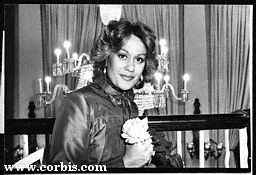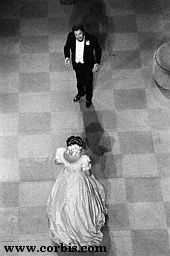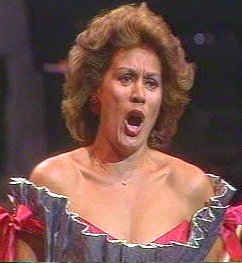![]()
Coasts
Rivers/Lakes
Lowlands/Plains
Geysers/Mud
Glaciers
Mt. Ruapehu
Mt. Cook
White Island
A Maori Legend
![]()
Abbotsford
Aramoana
Ballantynes
Brynderwyns
Cave Creek
Hawkes Bay
H.M.S. Orpheus
Influenza
Mt. Erebus
Mt. Tarawera
Rainbow Warrior
Seacliff Hospital
Tangiwai
Wahine
![]()
Annie Aves
Ata-hoe
Daisy Basham
Jean Batten
Minnie Dean
Mabel Howard
Margaret Mahy
Kath Mansfield
Kate Sheppard
Kiri Te Kanawa
Catherine Tizard
Murray Ball
Charles Goldie
Edmund Hillary
Richard Pearse
Lord Rutherford
Charles Upham
![]()
NZ FAQ--Funny
NZ Links
Credits
"I only have so much energy, so something had to go. This is why, at the end of the day, I've preserved my sanity for the children and also manage to do my best at work." -Dame Kiri Te Kanawa Dame Kiri Janette Te Kanawa has established herself New Zealand's best-known singer, as well as being one of the world's leading operatic sopranos. But the life of the young Maori girl who went on to become so famous has not always been smooth. Born on the 6th March, 1944 in Gisborne, New Zealand, Kiri's parents had decided to adopt their baby out. She was given her name by her father, Tom Te Kanawa. In Maori it means 'bell' an amazingly appropriate name for someone who would prove to be so talented vocally. Her adoptive mother discovered early on that her daughter showed potential and encouraged her to sing. At only six-years-old she sang 'Daisy, Daisy, Give Me Your Answer Do' and 'When I Grow Too Old To Dream' at a talent show organised by the famous Aunt Daisy. When Kiri was 12-years-old the family moved to Blockhouse Bay in Auckland. This allowed Kiri to attend St. Mary's College in Ponsonby where her singing teacher was the highly-regarded Sister Mary Leo. After a time Kiri began to sing at concerts and compete with her first national competition win being while she was still at St. Mary's. She sang the traditional Scottish song The Road To the Isles.
When Kiri left school she worked briefly as a receptionist while still taking lessons from Sister Mary Leo. After a time she discovered work and practice conflicted, so gave up her job to study music full-time, with the assistance of a grant from the Maori Education Foundation. Along with singing lessons she studied acting and German. To supplement the grant and raise funds Kiri started singing at various concerts and in nightclubs. She sang folk songs, Maori songs, popular numbers and performed in musicals like Annie Get your Gun. In 1963 Kiri entered the Mobil Song Contest, at that time held every second year and sponsored by the Mobil Oil Company. She placed second behind Malvina Major, another pupil of Sister Mary Leo. Like Kiri, Malvina Major went on to become an extremely successful opera singer. In 1965 Kiri entered the competition once more, this time she won. That same year Kiri travelled to Sydney and Melbourne to compete in the 'Sun Aria' competition. She placed second in Sydney and first in Melbourne. After being granted a Queen Elizabeth Arts Council Bursary in 1966 she travelled with her mother to England. Here she studied at the London Opera Centre while her mother returned home to New Zealand. By this stage Kiri was already well-known in her home country, but there was yet no inkling of the success she was to become overseas as well. While at the school she sang a number of parts in the operas they regularly produced. Desmond Park and Kiri met at Picadilly Circus on a blind date. Des was on a working holiday in London and after knowing each other just a matter of weeks the pair decided to marry. It was something of a shock for him to discover exactly how popular she was in New Zealand, when they returned here to wed. They married at St. Patrick's Cathedral in Auckland on the 30th August, 1967. For many years their marriage was a happy one, with Des spending most of his time helping Kiri manage the business side of her career. Although her husband was always 100% supportive of her work, opera never held an interest for him. When Kiri performed Richard Strauss's Capriccio for the first time, in San Francisco in 1990, Des travelled all the way to California to be with her. During the performance he sat in the dressing room reading the newspaper -- he never heard a single note. The couple adopted two children, Antonia (1976) and Thomas (1979); they were divorced in early 1997.
After leaving the Opera School Kiri started working with Vera Rosza who became her music teacher, prepared her for parts in various operas and trained her voice. In 1968 she returned to New Zealand and performed the lead role in Carmen. However, it was three years later when Kiri featured as the Countess Almaviva in The Marriage Of Figaro that she became really established. Having been turned down for nine previous parts made her work particularly hard on this project; as a result she was a stunning success. After that performance Kiri went on to play parts like Donna Elvira in Don Giovanni, Mimi in La Boheme, Desdemona in Otello, Pamina in The Magic Flute, Micaela in Carmen, Titania in Eugene Onegin and many, many other roles. She has performed at the Paris Opera, the Metropolitan in New York, the Vienna State Opera House, Glyndebourne and most other major opera houses in the world. Her career has allowed her to work with some of the world's foremost conductors and opera singers. In 1981, HRH the Prince of Wales married Lady Diana Spencer in St. Paul's Cathedral. Kiri was invited to sing Let the Bright Seraphim during the service. This performance was viewed by a huge congregation which included royalty from around the world, plus there was a television audience of more than six hundred million people. Her performance was certainly popular, however her dress was not with one critic describing it as, "a multi-coloured table-cloth with an air hostess hat!" The following year she was created a Dame of the British Empire by HM Queen Elizabeth II. Kiri has appeared in a number of films of operas including Don Giovanni and The Marriage Of Figaro. She has also sung in some unusual settings. One of these was the Australian outback where, as part of Australia's bi-centenary celebrations, she sang in a remote location in front of a crowd of 9,000 people. Her recordings include some popular songs and songs from various musicals such as West Side Story and South Pacific. In 1983 Kiri developed a throat problem that put her career in jeopardy. It would become dry and hoarse very suddenly, however, with treatment and rest this cleared up and Kiri regained full use of her voice. Throughout her career Kiri has avoided cigarette smoke, air conditioning and central heating lest she get a chill or her voice is adversely affected. Now over 50-years-old Kiri's career is drawing to a close but the sound of her voice on various recordings will always bring back memories of this powerful soprano in concert.
|




